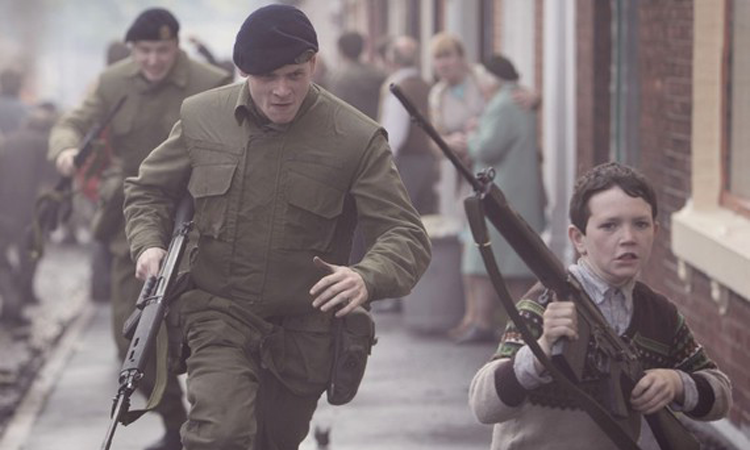
When I was a kid, war was the story. Growing up in Northern Ireland in the 1970s and ’80s meant being nurtured into believing that violence was everywhere. It kept us in the dark, literally, as we plunged into the painful realities around us; we were sometimes overwhelmed by sorrow and fear, but that disguised the stories of real hope and beauty that were unfolding, all the time. The benefit was that we developed empathy for people who are suffering, but we also grew sensitive to the way war stories are told. I’ve come to believe that stories may be the most powerful tool human beings have for reshaping our lives. We can tell war stories in ways that increase threat, or offer understanding; in ways that discourage us from repeating the mistakes of the past, or make us so numb to their horrors that we think war is a good idea. The way we tell war stories can determine whether there will be more wars to tell stories about in the future, or whether we keep evolving toward a time when we know war as something only our ancestors engaged in.
I’m thinking about this today because I just saw a new film, ’71, and it reminded me of the power of war stories.’71 pursues the artistic challenge of illustrating a whole world in 24 hours—it’s an action thriller that seeks to explain the tortured history of Northern Ireland through the events of just one night. In this gripping, disturbing film by director Yann Demange, English soldiers in 1971 are rudely awakened and told they’re getting shipped to Belfast to keep the peace between pro-Irish and pro-British militants. They see themselves as neutral, but the local communities feel differently. The IRA—itself split into two contentious factions—and its supporters perceive the soldiers as nothing but an army of illegal occupation. The Protestant Loyalist paramilitaries tend to like the army (to them, anything that keeps Ulster British is a good thing). But the army doesn’t necessarily like them. Some have more nefarious uses for local Protestant activists.
Into this mix lands Private Gary Hook, played with subtle authority by rising star Jack O’Connell (Unbroken), who gets left behind on his first foray out of his barracks and has to find a way home without being killed. The dark orange hues of Belfast streetlamps may light the way, but they can also expose him to shadowy figures watching for a chance to get another scalp. The rest of the film is a nail-biting chase in which the original meaning of “cinema” (movement, from the Greek kinesis) is on full display. Its quick cuts and fast-moving rhythm that allows the audience to stop for breath only as often as Private Hook make ’71 a master class for action directors. But that’s the extent of the mastery here. Scottish playwright Gregory Burke’s script has some intelligent dialogue: “We’re here to protect them and we need to tell them that” neatly sums up the paradox of a peacekeeping force not wanted by nearly half the population. And the complex position of Loyalists—British but not in Britain—is conveyed in this description of their capital city: “Belfast. Northern Ireland. The United Kingdom. Here.” But the dialogue isn’t good enough to explain the civil conflict that eventually took nearly 4,000 lives. The terrible things—or at least things like them—in ’71 really happened, within a political and moral context. It may not be what the filmmakers intended, but it would be easy to watch ’71 and think that the Troubles were all about the bloodlust of rabid attack dogs. I found ’71 too much about blood and adrenaline, as if the suffering of the people of Northern Ireland existed primarily as fodder for other people’s entertainment. It’s important for art to remind us that war is hell. It’s also important for art not to try to make us excited by it.
Instead, the best war stories use truth-telling and witnessing to help us lament suffering, honor courage, and learn from the past. Here are a few:
- Apocalypse Now shows the morass of Vietnam as a nightmare, a projection of the shadow side of power.
- Dr. Strangelove uses satire to stare at the madness of war, and makes the case that people really shouldn’t take political games too seriously.
- Downfall takes the risky step of humanizing Hitler and making him more comprehensible, thereby helping us understand how to prevent this kind of power being unleashed again.
- Born on the Fourth of July honors individuals who fought for their country, and were abandoned when they returned home.
- Flags of Our Fathers and Letters from Iwo Jima approach the same conflict from opposing sides, making it impossible to deny that our enemies are really just ourselves.
- The Thin Red Line, in which senseless bloody conflict plays out amid the most exquisite natural landscape, is one of the few films that deserves to be called a meditation. It’s also a lament, a vital part of the way we tell stories about war.
All of these films evoke what I believe is the most important element that makes a war story an antiwar story—in fact, it’s an element we should aim for every day, in every story we tell. It’s the feeling that Mozi, the 5th century BCE Chinese philosopher, described when he wrote that “if everyone were to regard the pain of others as their own person, who would inflict pain and injury on others?”
Gareth Higgins directs www.moviesandmeaning.com
To find out about Rose’s thoughts on how to live a happier life, click here
Post Disclaimer
This content is for informational purposes only and does not constitute medical advice. Please consult a healthcare professional for any medical concerns.


